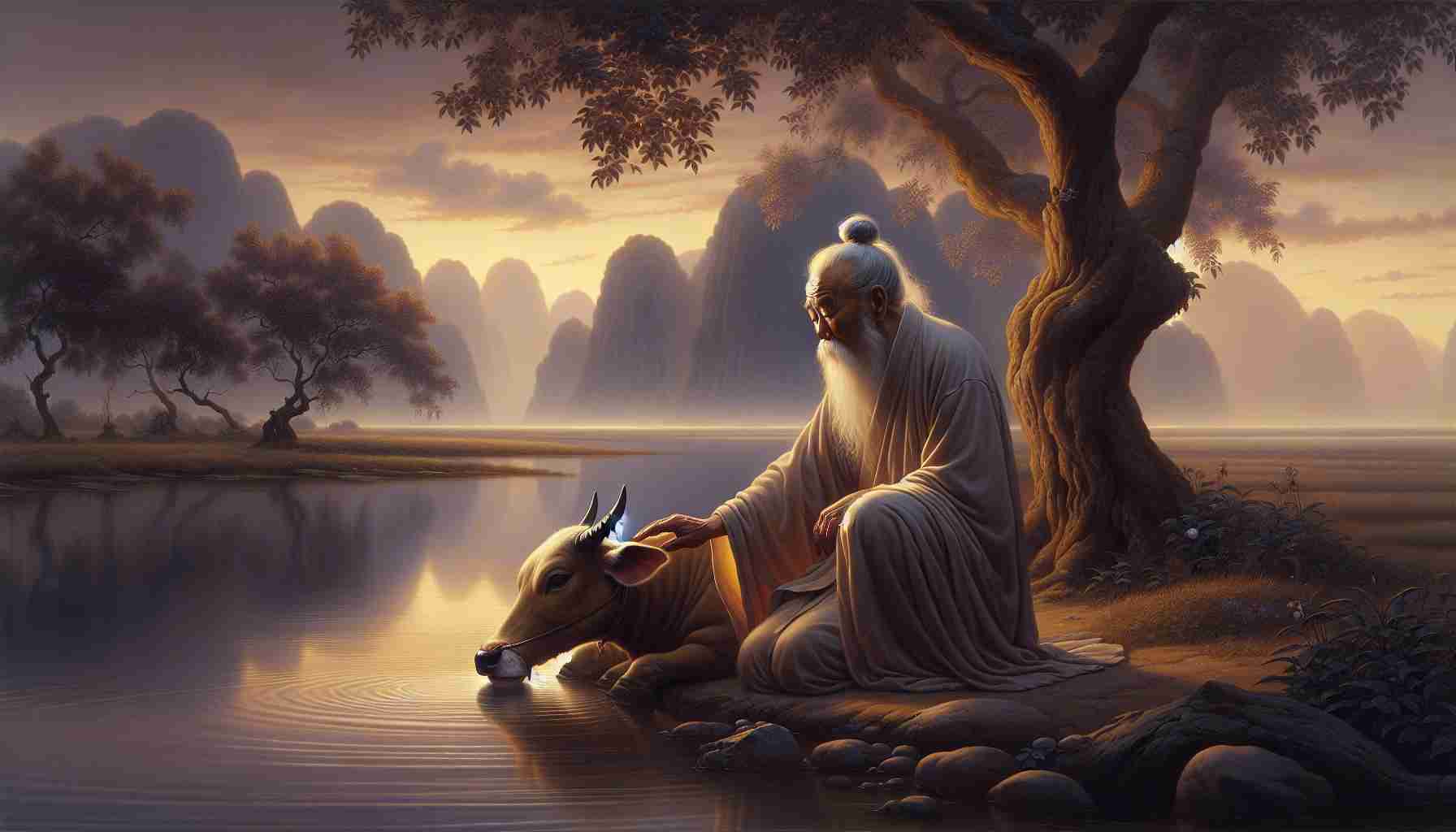

It was evening in the quiet valleys of ancient China. The wind rustled softly through the tall grass, and I sat by a small fire, my eyes still damp with tears. My name is Shen, and I worked in the gardens near the home of Laozi, the wise old man who taught the Way of the Tao.
Today, something changed. His ox died.
It may not seem like much, but that ox… that ox had been his companion for many years. A strong, gentle creature with eyes like calm water and hooves that stirred up dust along the long winding roads. Laozi rode that ox when he wandered through towns, sharing his quiet wisdom. People would often say, “Here comes the old master and his patient ox.”
So when the ox lay down beneath the plum tree and did not rise again, we all gathered around. I stood nearby, waiting to see what Laozi would say. Would he cry? Would he be angry or upset?
But he only looked at the ox, placed a hand on its head, and bowed. Then he said softly, “It has returned to the earth, just as clouds return to the sky.”
I didn’t understand. My hands were clenched. “But Master,” I asked, “aren’t you sad? The ox worked for you. It helped you. Shouldn’t we do something more?”
Laozi turned to me gently. His face, lined with years of quiet seeing, was calm. “Do you see the river, Shen?” he asked, pointing beyond the fields.
“Yes,” I answered.
“It flows,” he said. “When it rains, it flows harder. When it is dry, it still flows, but softly. The Tao is like this. It does not force. It does not hold. Everything moves in its time.”
I looked at the river. It made no sound of complaint. It simply kept moving.
I sat quietly the rest of the evening, listening to the fire crackle, thinking about his words. At first, I didn’t understand. How could he be so calm? The ox was gone.
The next morning I saw Laozi again. He was sweeping the front step, humming, as if nothing had changed. And that’s when it made sense to me—not all things have to be held on to. The ox had lived a full and useful life. Now, it was time for it to rest. No anger. No struggle. Just the soft flow of life, moving on.
Later that day, someone offered Laozi a new ox. He smiled and said, “When I need one, it will come.”
That was the moment I started to see the world differently. Not everything needed to be fixed or rushed. Some things just were, and that was enough.
I didn’t change overnight. But now, whenever I feel the urge to force things, I remember Laozi’s gentle bow to the ox and the quiet movement of the river. And I try to live more like that—simple, peaceful, and balanced with the Way.
It was evening in the quiet valleys of ancient China. The wind rustled softly through the tall grass, and I sat by a small fire, my eyes still damp with tears. My name is Shen, and I worked in the gardens near the home of Laozi, the wise old man who taught the Way of the Tao.
Today, something changed. His ox died.
It may not seem like much, but that ox… that ox had been his companion for many years. A strong, gentle creature with eyes like calm water and hooves that stirred up dust along the long winding roads. Laozi rode that ox when he wandered through towns, sharing his quiet wisdom. People would often say, “Here comes the old master and his patient ox.”
So when the ox lay down beneath the plum tree and did not rise again, we all gathered around. I stood nearby, waiting to see what Laozi would say. Would he cry? Would he be angry or upset?
But he only looked at the ox, placed a hand on its head, and bowed. Then he said softly, “It has returned to the earth, just as clouds return to the sky.”
I didn’t understand. My hands were clenched. “But Master,” I asked, “aren’t you sad? The ox worked for you. It helped you. Shouldn’t we do something more?”
Laozi turned to me gently. His face, lined with years of quiet seeing, was calm. “Do you see the river, Shen?” he asked, pointing beyond the fields.
“Yes,” I answered.
“It flows,” he said. “When it rains, it flows harder. When it is dry, it still flows, but softly. The Tao is like this. It does not force. It does not hold. Everything moves in its time.”
I looked at the river. It made no sound of complaint. It simply kept moving.
I sat quietly the rest of the evening, listening to the fire crackle, thinking about his words. At first, I didn’t understand. How could he be so calm? The ox was gone.
The next morning I saw Laozi again. He was sweeping the front step, humming, as if nothing had changed. And that’s when it made sense to me—not all things have to be held on to. The ox had lived a full and useful life. Now, it was time for it to rest. No anger. No struggle. Just the soft flow of life, moving on.
Later that day, someone offered Laozi a new ox. He smiled and said, “When I need one, it will come.”
That was the moment I started to see the world differently. Not everything needed to be fixed or rushed. Some things just were, and that was enough.
I didn’t change overnight. But now, whenever I feel the urge to force things, I remember Laozi’s gentle bow to the ox and the quiet movement of the river. And I try to live more like that—simple, peaceful, and balanced with the Way.